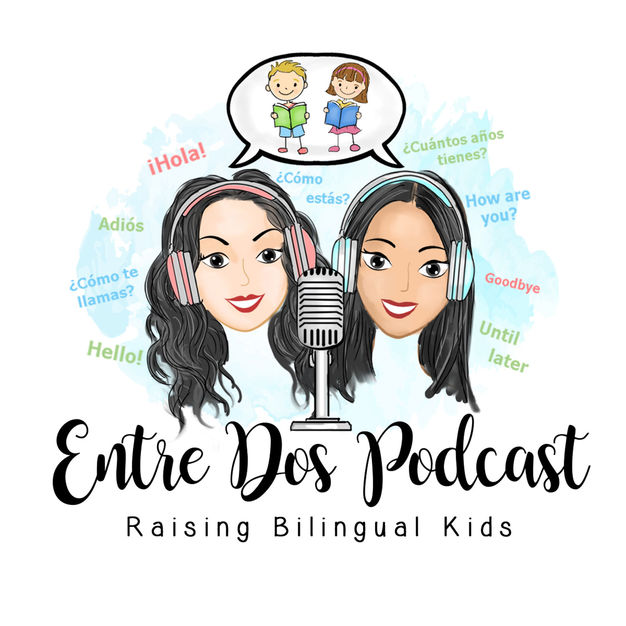
Entre Dos Podcast
Entre Dos Podcast
¡Bienvenidos! This is Entre Dos Podcast, where moms Paula and Monika share their quest to raise bilingual kids and, along the way, talk to educators, experts, linguists and regular parents. "Entre Dos" means "between two," which summarizes the challenges a lot of families face as they work to ensure their culture is passed on to the next generation. It's not easy, but people all over are figuring it out. So can you! Join Monika and Paula as they explore the bridge between language, culture and identity.
- 58 minutes 45 secondsHarmonious Bilingualism: A Chat with Dr. Annick De Houwer
Why do some children who grow up hearing two languages only use one? Our guest, Dr. Annick De Houwer, has been researching this question for years. De Houwer is a professor of language acquisition and multilingualism at the University of Erfurt in Germany and the founder of the Harmonious Bilingualism Network (HaBilNet). We spoke to her about her work, bilingual language development, and what she calls harmonious bilingualism.
 © Nadia Frantsen, University of Oslo
© Nadia Frantsen, University of Oslo
De Houwer has conducted extensive research in the field of bilingual acquisition and language development. Her 1990 book “The acquisition of two languages from birth” is considered pioneering work in bilingual acquisition. In addition to her linguistic research, she also examines the socio-emotional aspects of early bilingualism. De Houwer introduced the concept of harmonious bilingual development in 2006.
Additional Resources
- Harmonious Bilingualism Network (HaBilNet)
- Learning how to read and write in two languages, Janice Nakamura, HaBilNet.org
- Harmonious Bilingualism: Well-being for families in bilingual settings, Annick De Houwer, July 2019
- Why do so many children who hear two languages speak just a single language?, Annick De Houwer, 2020
31 March 2021, 5:45 pm - 27 minutes 26 secondsCuéntamelo: Maleta Books

 Alicia Sevillano Barja
Alicia Sevillano Barja
Welcome to the first episode of Cuéntamelo: Your Bilingual Story, a series by Entre Dos in which we speak to parents, small business owners, authors, and others about their bilingual life. These episodes may be shorter than our regular episodes and a bit more personal. Today’s inaugural episode is different than what you’re accustomed to because it’s entirely in Spanish.
Our first guest is Alicia Sevillano Barja, founder of Maleta Books, a bookshop in Ontario, Canada specialized in Spanish language books. We spoke with Alicia about her bilingual family, the origins of Maleta Books, and her current top three favorite children’s books.
2 March 2021, 3:05 am - 36 minutes 15 secondsGeneration Zero
In our first episode of 2021, we had a conversation with author Sabreet Kang Rajeev about her book, Generation Zero: Reclaiming My Parents’ American Dream, which tackles her family’s immigration story in America.

Identity and place can sometimes be abstract notions. They define who we are while also remaining elusive. In the process of integrating two or more cultures we are coming to terms with the things we’re ok with, the things we’re not ok with, and the things that are inevitable. In Generation Zero, Sabreet takes us through her struggles while also keeping her own parent’s experience in perspective. It’s a fascinating dance that many of us can relate to.
Sabreet is a first-generation Indian American of Sikh descent. She’s a full-time social-science researcher and holds an MA in sociology from the University of Maryland, Baltimore County, and BA in sociology from the University of Maryland, College Park. She is currently completing her doctorate at the University of Baltimore.
To continue the conversation, join us on Facebook, Instagram or Twitter @entredospodcast.
19 January 2021, 1:44 am - 36 minutes 32 secondsParenting with an accent: A conversation with writer Masha Rumer
Raising children with two languages and cultures may sometimes feel like a constant negotiation between the two. In this episode, writer Masha Rumer talked to her about her experience raising English-Russian bilingual children in the U.S.
 Masha Rumer
Masha Rumer
Masha lives in the Bay Area, where she writes about parenting and the immigrant experience. She is currently writing a book called Parenting with an Accent, which will be published by Beacon Press in 2021.
Mentioned in this episode
My Kids Can’t Sing Along to Sesame Street, But They Know Our Family’s Culture by Masha Rumer, Parents
Maximize Your Child’s Bilingual Ability by Adam Beck
Bilingual: Life and Reality by Francois Grosjean
6 August 2020, 7:17 pm - 42 minutes 20 secondsDual Language Programs in the Pandemic: The story of Naperville 203.
In the past few weeks, the topic of the 2020-21 school year has reached a fever pitch, with good reason. As we pay close attention to the discussions surrounding PPE, social distancing, hybrid and virtual models, one thing that seems to be missing from most discussions is efforts to ensure continuity in the many dual-language programs across the nation. This is why we spoke with Rosa Campos, one of the organizers of Save Dual Language in Naperville, IL. The campaign is advocating for the dual language program to meet the language and cultural needs of its dual-language students, whether it be from a distance or in person.

A few days after we recorded our interview with Rosa, she sent us an update. The Naperville school district will offer specialized programs, like dual language, for all students. Congratulations to the organizers and most of all to the Naperville student body!
The Save Dual Language in Naperville campaign website will remain live to serve as a resource for other school communities that are experiencing changes in their dual-language program. You can also follow them on Twitter here.
3 August 2020, 2:53 pm - 29 minutes 38 secondsAdvocating for Bilingualism: A Call to Action
Advocating for our children is an inherent part of parenting. We do it every single day in both big and small ways. We know bilingualism is good and we want it for our children. So how can we advocate to make languages more accessible in our communities? In this episode, we begin exploring how you can go from knowing to doing with our guest, Amanda Seewald, the president-elect of the Joint National Committee for Languages. Think of it as a call to action.
 Amanda Seewald
Amanda Seewald
Amanda is the owner of Maracas Language Programs, has raised a bilingual daughter and son, and is an experienced language teacher. She spends much of her time advocating for language programs and policy.
Mentioned in this Episode
- JNCL NewsBrief – Sign up for alerts, calls to action, and news about language education, advocacy, and policy.
- Parents for Language Facebook Group
- America’s Languages: Investing in Language Education for the 21st Century, American Academy of Arts & Sciences Commission on Language Learning, Feb 2017
- Making Languages Our Business: Addressing Foreign Language Demand Among U.S. Employers
29 May 2020, 3:43 am - 25 minutes 4 secondsWe Live Languages: A talk with Madalena Xanthopoulou
If you listen to this podcast, you probably have a language vision or goal for your family. Our guest, Madalena Xanthopoulou, founded We Live Languages to help multilingual families reach those goals by translating research into actionable steps. Madalena is trilingual and raising trilingual kids. She shared some very useful ideas for families to increase exposure and form communities of support through which they can foster language.
 Madalena Xanthopoulou of We Live Languages
Madalena Xanthopoulou of We Live Languages
The We Live Languages website has tons of resources for multilingual families; you can take a quiz to determine the language profile of your home and read stories of families that are similar to yours.
The company is also launching a free email series on May 20 to help parents raising multilingual children. Sign up here and make sure you follow them on social media @welivelanguages
Mentioned in this Episode
Grassroots Community Digital Kit – free download by We Live Languages
14 May 2020, 3:17 am - 26 minutes 59 secondsVeoleo: Bringing kids programming to a screen near you
Sisters Janike and Alexis Ruginis started their own small book press when they realized there was a lack of Spanish-language books for young children in the U.S. Veoleo published its first book, ¿Dónde está el coquí? in 2018 and it’s currently working on two new books aimed at bilingual little ones.
 Alexis & Janike Ruginis
Alexis & Janike Ruginis
In this episode, we talked to Alexis about their business and their current efforts to bring enjoyable activities to kids and families who are staying home due to COVID-19.
If you’re not familiar with Veoleo, check them out on Instagram @veoleo.co or sign up for their newsletter to learn about their upcoming virtual events and activities.
21 April 2020, 2:19 am - 23 minutes 54 secondsLanguage learning, family-style
Moving to another country where you don’t know the language can be challenging. Today’s guest, Elizabeth Quintal, did just that. Two-and-a-half years ago, she moved from Houston, Texas to Madrid, Spain with her husband and son, Grayson. We spoke to her about the transition and how they’re managing the strict lockdown due to COVID-19.
 Elizabeth and her family in Paris.
Elizabeth and her family in Paris.
You can find Elizabeth in several places on Instagram. She’s worth a follow for her poetry writing (@elizabethmquintal) and her family adventures and tips on advocacy and raising kind, empathetic kids (@cheekydays). She and her husband, Aaron, run a visual creative agency called The New Antiquarians.
Elizabeth’s poetry will also be featured in Alegria Magazine’s upcoming The Latinx Poetry Project, an anthology of poems by Latinx authors. The book is now available for pre-order through this link.
6 April 2020, 7:29 pm - 31 minutes 41 secondsMoco y Baba: A grassroots language community
Having a community of support is such an essential part of raising bilingual children. Depending on the area you live in, finding that community can be hard – but it is possible to create your own.
 Johanna Arteaga, founder of Moco y Baba, and her daughter, Miranda.
Johanna Arteaga, founder of Moco y Baba, and her daughter, Miranda.
Johanna Arteaga is the founder of Moco y Baba, a community of Spanish-speaking families in London. She also recently launched Cuéntamelo Books, an online bookstore that carries a curated selection of books from Latin America. Johanna talked to us about how she started Moco y Baba and gave us some tips and advice about how to start a language community in your area.
We talked to Johanna before COVID-19 completely changed the way we interact with each other and, although the group had to forgo in-person meetings temporarily, the community remains steadfast.
23 March 2020, 9:33 pm - 16 minutes 13 secondsEffects of Bilingualism on English Reading Ability
 Dr. Jackie Relyea
Dr. Jackie Relyea
In this episode, we spoke to Dr. Jackie Relyea, assistant professor of Literacy Education at North Carolina State University. Her research looked at English reading growth in Spanish-speaking bilinguals.
Additional Reading
Reading in any Language Improves Reading Levels in English, Language Magazine, Sep. 27, 2019
English Reading Growth in Spanish‐Speaking Bilingual Students: Moderating Effect of English Proficiency on Cross‐Linguistic Influence, Child Development, July 16, 2019
5 February 2020, 7:54 pm - More Episodes? Get the App
Your feedback is valuable to us. Should you encounter any bugs, glitches, lack of functionality or other problems, please email us on [email protected] or join Moon.FM Telegram Group where you can talk directly to the dev team who are happy to answer any queries.
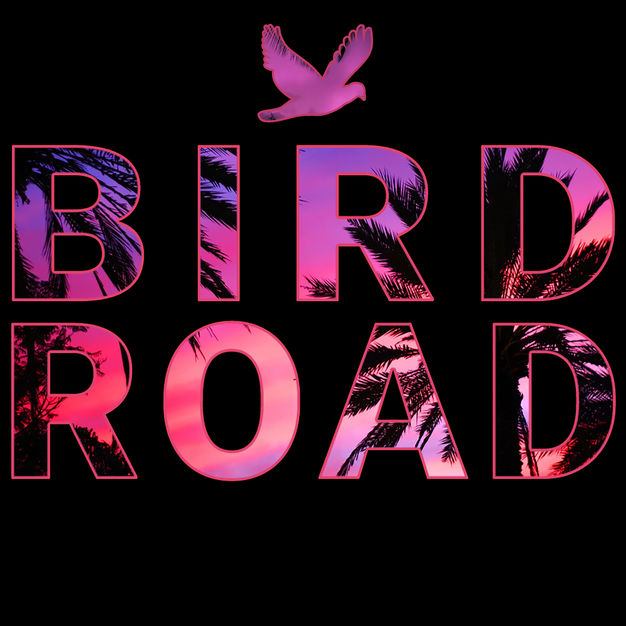 Bird Road Podcast - All Points West
Bird Road Podcast - All Points West
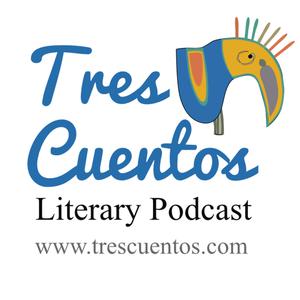 Tres Cuentos Literary Podcast
Tres Cuentos Literary Podcast
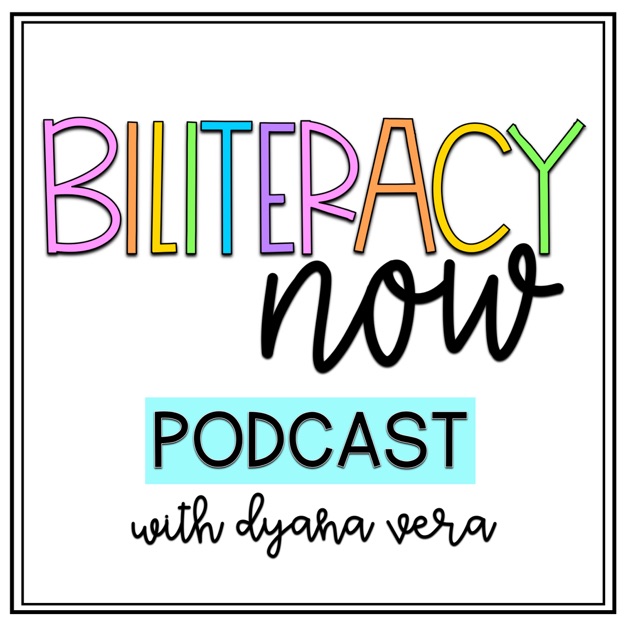 Biliteracy Now
Biliteracy Now
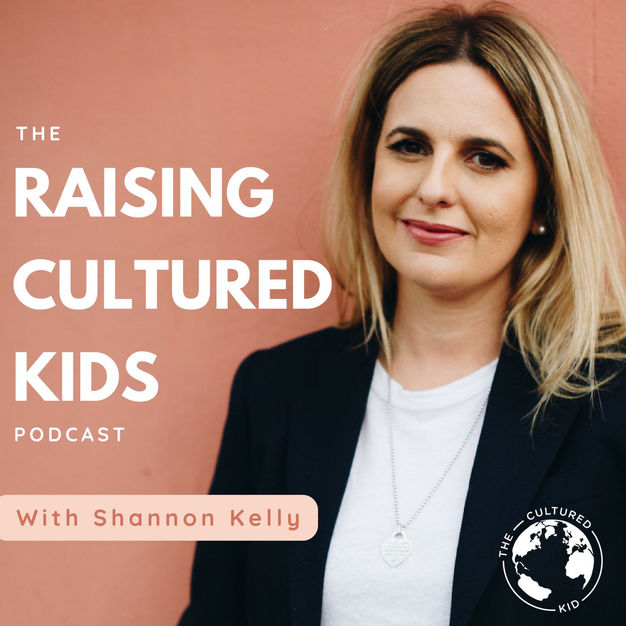 Raising Cultured Kid's Podcast
Raising Cultured Kid's Podcast
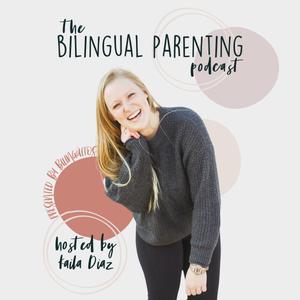 Bilingual Parenting Podcast
Bilingual Parenting Podcast
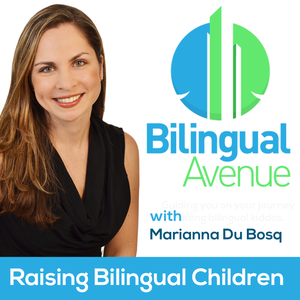 Bilingual Avenue with Marianna Du Bosq
Bilingual Avenue with Marianna Du Bosq